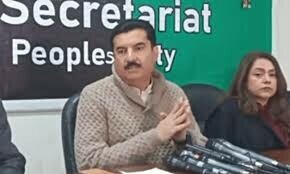PESHAWAR, Feb 25: Discharge of untreated effluents from Khazana Sugar Mills has turned Shahalam River into a dead tributary causing water, land and air pollution in the surrounding areas of the provincial capital.
Thousands of litres of hazardous waste are discharged into Shahalam, a tributary of River Kabul, daily during crushing season, which starts from December every year and continues till the end of March. Local people say that they cannot use the river water due to toxic waste.
Khazana Sugar Mills which was privatised in mid-1990s situated near the river. Its crushing capacity is 4,000 tons per day, but presently it crushes over 2,000 tons of sugarcane daily due to lack of supply, says the management of the mills.
The mills’ manager administration Tali Mand said that over 200,000 tons of sugarcane had been crushed during current season. He said that the management had planed to build treatment plant before discharging the waste into the river, but the mills was going into losses which delayed the project.
The mills’ effluent is released into Shahalam River without treatment. Environmentalists said that hazardous substances discharged from the sugar mills absorbed oxygen from the water which caused water and air pollution.
Residents of Khazana complain that discharge of untreated waste from the mills is not only polluting the river, but also causing severe air pollution.
“We can hardly breathe because of the stink of effluents,” said Izatullah, a resident of Khazana. Industrial waste, he said, posed threat to aquatic life and every year killed thousands of fish in the river when the management washed the mills. Shahalam throws toxic waste of Khazana Sugar Mills into Kabul River.
Provincial Environmental Protection Agency director general Dr Bashir Khan said that release of hazardous industrial waste into the river was a crime under the law and the agency would take legal action against the management of the mills. “The EPA inspectors will immediately visit the site and will serve notice on the mills’ management,” he added.
Under section 11(1) of the Environmental Protection Act, 1997 no person shall discharge or emit or allow the discharge or emission of any effluent or waste or air pollutant or noise in an amount, concentration or level which is in excess of the National Environmental Quality Standards.













































Dear visitor, the comments section is undergoing an overhaul and will return soon.